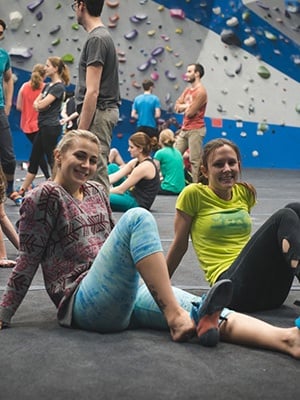The Sendy Times
Expand your climbing knowledge with training tips and tricks from Movement's instructors, trainers, and coaches.

Rock Climbing | Climbing Community
By: Rachel Osborne
Let's be real - there's a lot to love about climbing. As we head into the season of gratitude (and prime sending temperatures), here's a reminder of why we're thankful to be part of this chalk-dusted family:

Rock Climbing | Climbing Community
By: Movement
Ever wonder how your zodiac sign influences your climbing style? We’ve put together a fun climbing horoscope just for you. Find out what the stars say about your next send and discover tips tailored to your sign!

Get the latest climbing news, tips and tricks straight to your inbox.

Rock Climbing | Climbing Community
By: Movement
Are you looking for the best climbing gyms in the Bay Area? With four unique locations—soon to be five—in San Francisco, Belmont, Sunnyvale, and Santa Clara, Movement Gyms provide world-class experiences for everyone, from first-time climbers to seasoned experts. Each gym offers a distinct combination of climbing terrain, fitness and yoga spaces, and a vibrant community atmosphere. Here are some of our favorite highlights from each location:

By: Hunter Price
With any big dream, there’s always a moment when it feels too big, too unattainable, and maybe even a little crazy to say out loud. For Brooke Deans, that moment came in the fall of 2023 when she decided to take on the challenge of a lifetime: running a 100-mile race. And not just any race—the Canyons 100 Mile Endurance Run, part of the prestigious UTMB World Series, and the only major of its kind in North America. Brooke had only been racing for a year, with three races under her belt—two 50Ks and one 50-miler. But she was ready for this monumental leap.

Climbing Community | Climbing Tips | Start Climbing | outdoor climbing
By: Juliana Brown
So, you just started climbing at a Movement Gym - congrats! Now that the weather is cooling down and the leaves are starting to change, you may be thinking about gearing up and taking your skills outside. Climbing is not only a great way to stay active and grow your community, but it's also an amazing way to enjoy the outdoors, especially in fall, when the temperatures are cooler, and the crisp air makes it ideal for sending.

Rock Climbing | Climbing Gear | Climbing gifts
By: Rachel Osborne
The holiday season will be here faster than a Sam Watson speed run. Looking for the perfect gift for your favorite climber? We've got you covered with everything from chalk to crash pads. Here's our comprehensive guide to gifts that'll get any climber psyched - whether they're projecting their first V2 or crushing 5.13.

By: Hunter Price
Oh, the clichés of falling. “Our greatest glory is not in never falling, but in rising every time we fall.” Thank you, Confucius, for that timeless nugget of wisdom. In climbing, though, it's not just about getting back up — it's the quality with which we get up and how we try again. Falling is inevitable. If you’re climbing, you’re going to fall. The very first time you step into our gym, it’s explained. We start with an orientation video explaining that falling is part of the deal and how to do it safely: spot your landing, tuck your arms in, legs shoulder-width apart, bend the knees, roll onto your bum and back. All the technical stuff to keep gravity from getting the best of you. But beyond the physical technique, there’s a whole art to falling. A deeper lesson. Let’s talk about what it means to fall—and what it can teach us, both in climbing and beyond.

Climbing Community | Training for Climbing
By: Erin
Stalling out is seemingly the most normal thing that can happen to a person in climbing, but that doesn’t make it any less frustrating, and it certainly doesn’t make it easier to fix. In early 2022, I was stuck on the Dinner Ledge of plateaus and searching for a way to improve, when my friend and climbing partner let me know that Movement Sunnyvale was starting up Peak Performance Training (PPT). I decided that getting professional coaches involved was a solid plan, so I signed up.

Climbing Community | Press Releases
By: Movement
Movement is excited to announce Anne-Worley Moelter as our new Chief Executive Officer. This change marks a significant milestone in our company's journey and reaffirms our commitment to the core values that have been integral to Movement's identity since day one.

Training for Climbing | Climbing Tips
Does this sound like you? You’ve been climbing consistently, hangboarding, and training off the wall, but you still can’t send your project. Or maybe you’re a more casual climber but you’re so sore after each session, you’re not able to climb as much as you’d like. Either way, the missing puzzle piece may be nutrition.